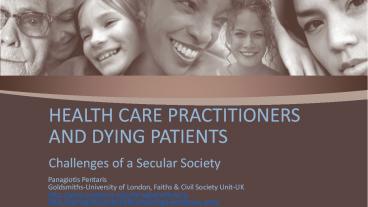Panagiotis%20Pentaris%20Goldsmiths-University%20of%20London,%20Faiths%20 - PowerPoint PPT Presentation
Title:
Panagiotis%20Pentaris%20Goldsmiths-University%20of%20London,%20Faiths%20
Description:
HEALTH CARE PRACTITIONERS AND DYING PATIENTS Challenges of a Secular Society Panagiotis Pentaris Goldsmiths-University of London, Faiths & Civil Society Unit-UK – PowerPoint PPT presentation
Number of Views:155
Avg rating:3.0/5.0
Title: Panagiotis%20Pentaris%20Goldsmiths-University%20of%20London,%20Faiths%20
1
HEALTH CARE PRACTITIONERS AND DYING
PATIENTSChallenges of a Secular Society
- Panagiotis PentarisGoldsmiths-University of
London, Faiths Civil Society Unit-UK - http//gold.academia.edu/PanagiotisPentaris
- http//panagiotispentaris4thanatology.wordpress.co
m/
2
Overview
- Religious/ non-religious needs of dying patients,
- Religious historiography in the UK and broader
Europe, - Secularism,
- Process to secularism,
- Religious literacy in health care practice.
3
- The goal of a quality comfortable death is
achieved by meeting a patients physical needs
and by attending to the social, psychological,
and the now recognized spiritual and religious
dimensions of care - Daaleman VandeCreek 2000 p.2514
4
Religious Historiography
The growth of Secularism on the grounds of an
Anglican Church1905 - Present
Anglicanism ? Religious Diversity ? Secularity ?
Religious Pluralism
5
Interesting facts
- http//www.youtube.com/watch?vDScmdOpOXSk
- UK Census 2011 data
- 59.3 Christianity
- 4.8 Islam
- 25.2 No religion
- Defining religion, spirituality and faith.
- Patients have emotional and spiritual needs
(End of Life Strategy 2008) - Spirituality is key to quality affairs (NIH)
- religious people are referred to a church
(Pentaris, n.d.)
6
Religious Literacy
- Attitudes and understandings towards religious
and/or non-religious beliefs, - Knowledge skills.
7
Religious Literacy in Thanatological Practice
(RLTP)
- Awareness and understanding of religious
plurality within health care practice,
comprehended knowledge that conveys the
relationship between faith and the experiences of
death and bereavement, and individualistic
willingness and professional motivation for
enhanced end of life or hospice care (i.e.
thanatological practice).
8
Conclusion
- if staff have the necessary knowledge, skills
and attitudes, it can be immensely satisfying.
End of Life Strategy 2008 - UK - Spirituality is part of the basic human
experience. Whenever we search for meaning, or
for a connection outside of ourselves, we are
acting as spiritual beings. Spirituality exists
in our connection to other humans, our
environment and the unfolding universe beyond,
and the transcendent. Dr. Kreitzer Center for
Spirituality and Healing - Faith and hope are the greatest assets of the
patient. Listening is the greatest asset of the
caregiver.
9
Conclusions
- People only die once. What if we want to die in
style, while writing the final chapter of a book?
10
Questions answers
11
Resources
- Daaleman, T.P. VandeCreek, L., 2000. Placing
religion and spirituality in End-of-Life care.
JAMA, 284(19), pp.2514-2517 - Pentaris, P. 2012. Religious competence in social
work practice The UK picture. Social Work
Society, 10(2), pp.1-4 - Swatos, W.H. Christiano, K.L., 1999.
Secularization theory The course of a concept.
Sociology of Religion, 60(3), pp.209-228 - National End of Life Care Programme
http//www.endoflifecare.nhs.uk/ - Faiths Civil Society Unit Goldsmithshttp//ww
w.gold.ac.uk/faithsunit/































